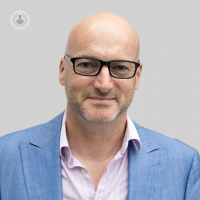When should I get checked out for atrial fibrillation?
Written in association with:Top Doctors recently spoke to esteemed consultant cardiologist, Dr Martin Lowe, to find out what the main causes and symptoms of atrial fibrillation are, how the condition is diagnosed, and who is most at risk.

Can you detail what atrial fibrillation is?
Atrial fibrillation is an irregularity of the heart rhythm. Essentially, it arises due to the atria suddenly starting to beat in an erratic and irregular way.
What are the main symptoms and causes?
Patients with atrial fibrillation typically notice that their heartbeat becomes excessively fast. People also notice an irregularity of the heartbeat, and will notice that their heartbeat goes from steady to fast and back down to steady again, even when they are simply resting.
They also may feel breathless, they may develop chest discomfort or chest tightness, and they may also feel faint or dizzy because their blood pressure has been affected by the sudden change in heart rate, and, occasionally, it can lead to the patient collapsing.
How is it diagnosed?
It is diagnosed mainly by performing an ECG, which is an electric reading of the heart. It can also be diagnosed by a simple pulse test. For those patients that suffer from intermittent atrial fibrillation, the diagnosis can be more difficult, because at times, the patient’s blood pressure and pulse rate change dramatically when they suffer from atrial fibrillation episodes.
When should I get checked out for atrial fibrillation?
Anyone who has symptoms that are suggestive of atrial fibrillation should get checked out. Also, people who have or who have had previous heart-related problems should get checked out.
Who is most at risk?
Those who have had a previous heart problem are most at risk, as well as those who are born with a heart abnormality. For those who have had heart valve issues are also at risk, even if their heart valve has been corrected surgically. Patients with high blood pressure are also at risk.
Is there a cure for atrial fibrillation? What does treatment involve?
We are slightly hesitant when we talk about a cure for atrial fibrillation. It can be a difficult condition to treat. There is indeed the potential for cure in patients that do not have other underlying heart problems.
The curative technique, in this case, is called ablation, which means essentially treating the underling causes of atrial fibrillation directly, by a keyhole technique, whereby we pass catheters up from the vein at the top of the leg around to the heart. Then, we treat the pulmonary veins. Up to 90 per cent of patients can be cured from atrial fibrillation if they are treated this way.
Mr Martin Lowe is a distinguished consultant cardiologist who specialises in atrial fibrillation. Consult with him today to book a consultation with him.


